Step/uk: Difference between revisions
(Created page with '== Опис ==') |
(Created page with ''''Step''' — це інтерактивний фізичний імітатор. Ось як він працює: ви розташовуєте певні фізичні тіл...') |
||
| Line 10: | Line 10: | ||
== Опис == | == Опис == | ||
'''Step''' | '''Step''' — це інтерактивний фізичний імітатор. Ось як він працює: ви розташовуєте певні фізичні тіла на полі, додаєте певні сили, зокрема сили притягання або пружини, а потім натискаєте кнопку '''Імітувати'''. У відповідь '''Step''' показує вам розвиток подій на полі відповідно до законів фізики. Ви можете змінювати всі властивості тіл або сил у вашому експерименті (навіть під час імітації) і бачити, як внесені зміни впливають на перебіг експеримента. За допомогою '''Step''' ви зможете не лише навчити фізики, але і показати, як працює фізика! | ||
==Features== | ==Features== | ||
Revision as of 17:01, 5 October 2010
Домівка » Програми » Освіта » Step/uk

|
Step — це інтерактивний фізичний імітатор. Програма надає вам змогу досліджувати фізичний світ за допомогою імітації його явищ. Програма є частиною освітнього проекту KDE. |
Опис
Step — це інтерактивний фізичний імітатор. Ось як він працює: ви розташовуєте певні фізичні тіла на полі, додаєте певні сили, зокрема сили притягання або пружини, а потім натискаєте кнопку Імітувати. У відповідь Step показує вам розвиток подій на полі відповідно до законів фізики. Ви можете змінювати всі властивості тіл або сил у вашому експерименті (навіть під час імітації) і бачити, як внесені зміни впливають на перебіг експеримента. За допомогою Step ви зможете не лише навчити фізики, але і показати, як працює фізика!
Features
- Classical mechanical simulation in two dimensions
- Particles, springs with dumping, gravitational and coulomb forces
- Rigid bodies
- Collision detection (currently only discrete) and handling
- Soft (deformable) bodies simulated as user-editable particles-springs system, sound waves
- Molecular dynamics (currently using Lennard-Jones potential): gas and liquid, condensation and evaporation, calculation of macroscopic quantities and their variances
- Units conversion and expression calculation: you can enter something like "(2 days + 3 hours) * 80 km/h" and it will be accepted as distance value (requires libqalculate)
- Errors calculation and propagation: you can enter values like "1.3 ± 0.2" for any property and errors for all dependent properties will be calculated using statistical formulas
- Solver error estimation: errors introduced by the solver is calculated and added to user-entered errors
- Several different solvers: up to 8th order, explicit and implicit, with or without adaptive timestep (most of the solvers require GSL library)
- Controller tool to easily control properties during simulation (even with custom keyboard shortcuts)
- Tools to visualize results: graph, meter, tracer
- Context information for all objects, integrated wikipedia browser
- Collection of example experiments, more can be downloaded with KNewStuff2
- Integrated tutorials
Screenshots
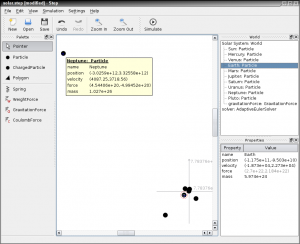 |
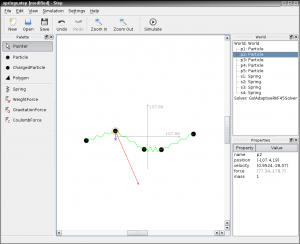 |
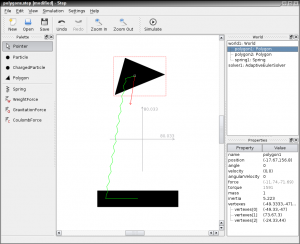 |
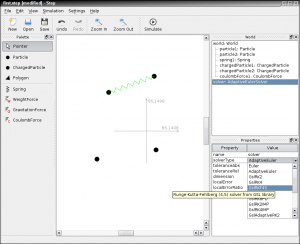 |
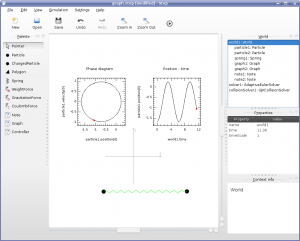 |
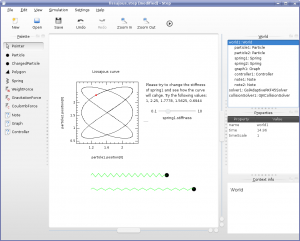 |
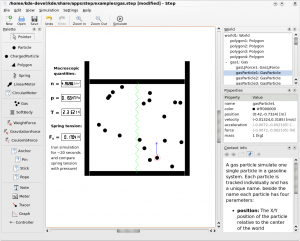 |
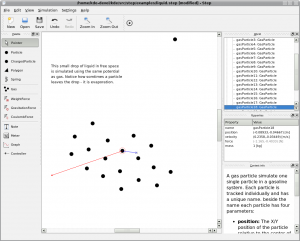 |
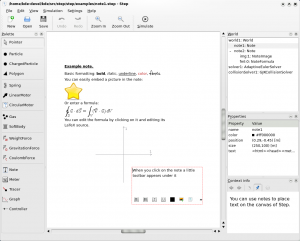 |
Documentation
Weblinks
StepCore Library
StepCore is the physical simulation library on which Step is based. It can be used without Step for complex simulations which require coding or in other software which require physical simulation functionality. It is designed in order to be extensible, tunable and to provide accurate simulation.
You can find more information about the StepCore library on techbase.kde.org.
